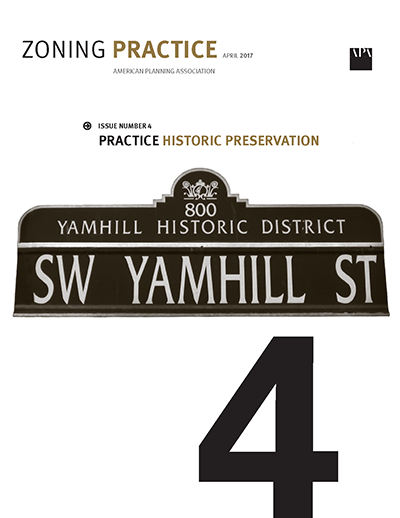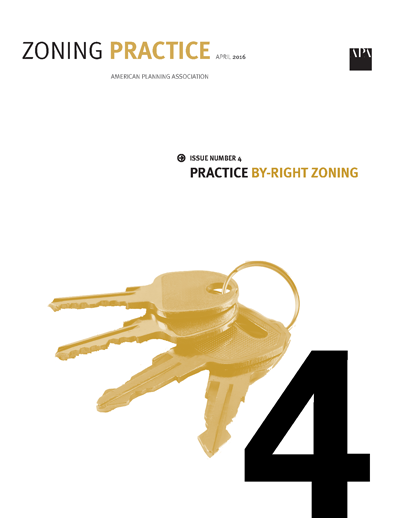Looking for education on this topic?
Check Out Our Passport Courses
Passport is your ticket to the training, experiences, and connections that will take you where you want to go in your planning career. Subscribe for unlimited access for one year to APA's extensive learning library of solution-oriented content facilitated by planners, for planners.
-
Washington County, MD, Zoning Ordinance
Updated April 2018The county's zoning ordinance allows accessory solar collection systems in all districts subject to standards, and allows primary use solar energy generating systems as special exception uses in certain districts. -
Greensburg, KS, Sustainable Comprehensive Plan
Adopted May 2008The city's comprehensive plan belongs to the Solar Energy and Wind Energy collections. -
Los Alamos County, NM, Code of Ordinances
Updated September 2023The county's code provides for solar access protections and the keeping of livestock in residential districts. -
Plano, TX, Plano Tomorrow Comprehensive Plan
Updated 2021This city's comprehensive plan, which received APA's 2017 Daniel Burnham Award for a Comprehensive Plan, was adopted in 2015 and achieved Silver-level recognition in APA's Comprehensive Plan Standards for Sustaining Places Recognition Program Pilot in 2016. -
Residential Infill Development
Residential infill development refers to the development of new housing on vacant or underutilized land in previously developed areas. This collection catalogs resources that provide background information and demonstrate how local and regional entities are using plans and plan implementation mechanisms to guide successful residential infill development. -
Sunnyvale, CA, Municipal Code
Updated August 2019This regulation belongs to the Food Systems, Food Trucks and Green Building collections. -
Jacksonville, FL, Code of Ordinances
2017The city's zoning code was amended in 2015 to allow chicken keeping in certain zoning districts and addresses other livestock as well. -
Clearwater, FL, Code of Ordinances
Updated September 2021This city's codified ordinance belongs to the Food Systems, Shared Mobility, and Urban Livestock collections. -
Chattanooga, TN, Code of Ordinances
Updated October 2021These regulations belong to the Complete Streets and Urban Agriculture collections. -
Building Capacity for Urban Agriculture Programs: Tools from the Windy City Harvest Model
by: Elise Benveniste, Eliza Fournier, Emily HestnessThis toolkit belongs to both the Food Systems and Urban Agriculture collections. -
De Pere, WI, Code of Ordinances
2017The city's animal code allows the keeping of chickens and bees in residential districts with a permit. -
North Kingstown, RI, Revised Ordinances
Updated August 2021These regulations belong to the Solar Energy and Urban Agriculture collections. -
Huntsville, AL, Code of Ordinances
Updated September 2020These regulations belong to the Food Trucks and Solar Energy collections. -
Fairfax, VA, 2035 Comprehensive Plan
Adopted February 2019The city’s comprehensive plan was adopted on February 2019, organizes its core outcomes in 5 main Chapters and 12 sub sections. -
Hadley, MA, Code of Ordinances
Updated May 2021The town's zoning bylaw includes a transfer of development rights program for farmland protection. -
Spokane, WA, Municipal Code
Updated June 2021This regulations belongs to the Accessory Dwelling Units, Climate Change, and Tactical Urbanism collections. -
Corpus Christi, TX, Unified Development Code
2016Corpus Christi, Texas, adopted a new unified development code in 2011. -
Silver Bullet or Trojan Horse? The Effects of Inclusionary Zoning on Local Housing Markets in Greater Boston
March 2009by: Jenny Schuetz, Rachel Meltzer, Vicki BeenThis briefing paper examines inclusionary housing policies in the Boston metropolitan area and compares them to those in the San Francisco Bay area and greater Washington, D.C. -
Inclusionary Housing: Creating and Maintaining Equitable Communities
2015by: Rick JacobusThis report reviews the literature and case studies to detail how local governments are realizing the potential of inclusionary housing. -
Clearwater, FL, Community Development Code
Updated September 11, 2018by: Clearwater, FLThis regulation belongs to the Inclusionary Housing and Transfer of Development Rights collections. -
Promoting Workforce Housing: Expanding Locations and Development Potential
2008These models belong to the Accessory Dwelling Units, Affordable Housing Programs, and Housing Supply Planning collections. -
Lessons for LEED® for Neighborhood Development, Social Equity, and Affordable Housing
Journal of the American Planning Association, 82(1): 37-49, 2016by: Nicola SzibboThis article belongs to the Affordable Housing Programs, Green Building, and Social Equity collections. -
Coconino County, AZ, Zoning Ordinance
Updated December 2023This regulation belongs to the Accessory Dwelling Units, Housing Supply Planning, and Outdoor Lighting collections. -
Bloomington, IN, Municipal Code
Updated October 2019This regulation belongs to the Accessory Dwelling Units, Green Building, and Housing Supply Planning collections. -
Kaua'i, HI, County Code
Updated June 2020This regulation belongs to the Affordable Housing Programs, Climate Change, and Hazard Mitigation collections. -
Chula Vista, CA, Municipal Code
Adopted February 2019This regulation belongs to the Accessory Dwelling Units, Housing Supply Planning, and Solar Energy collections. -
Bozeman, MT, Code of Ordinances
Updated December 2019This regulation belongs to the Accessory Dwelling Units, Green Stormwater Infrastructure, Group Housing, Historic Preservation, Housing Supply Planning, Marijuana-Related Uses, and Urban Livestock collections. -
Beaufort, SC, The Beaufort Code
Updated July 2018These regulations belong to the Accessory Dwelling Units, Form-Based Zoning, and Housing Supply Planning collections. -
Comparing Three Online Civic Engagement Platforms Using the Spectrum of Public Participation Framework
Connected Communities, September 2014by: Matti Nelimarkka, Brandie Nonnecke, Sanjay KrishnanThis article utilizes the International Association of Public Participation’s “Spectrum of Public Participation” framework to evaluate how well three online platforms support civic engagement principles. -
Designing an Online Civic Engagement Platform: Balancing “More” vs. “Better” Participation in Complex Public Policymaking
International Journal of E-Politics, 5: 16-40, 2014by: Cynthia Farina, Dmitry Epstein, Josiah HeidtThis article presents a case for basing a new model of civic participation in the theory and practice of democratic deliberation. -
Oregon Comprehensive Land Use Planning Statutes
Revised Statutes §§197 and 197A, Amended 2019These statutes belong to the Accessory Dwelling Units and Planning and Zoning Enabling Laws collections. -
Integrating Land Use and Water Planning for a Sustainable Future
Planners and allied professionals should know that when you plan for one, you have to plan for both.by: Heather Hansman July 01, 2021In communities across the U.S., water managers and planners are emerging from the silos they've traditionally operated in to find new ways to work together. The urgency of collaborating to develop resilience in the face of climate change threats is becoming increasingly clear. -
Protecting Value Through Historic Preservation Regulations
Zoning Practice — April 2017by: Lane Kendig April 01, 2017This issue of Zoning Practice discusses how careful planning and drafting of zoning standards can help mitigate landowner concerns while advancing historic preservation goals. It covers both district-based and scattered-site approaches to historic preservation regulations.List Price$10.00ZP subscriber$0.00 -
Music Policy (Taylor’s Version): A Healthy Music Ecosystem Calls for an Intentional Approach
Five steps your city can take to become a music city and support the next big star.by: Kati Woock November 22, 2023Five steps your city can take to become a music city and support the next big star. -
Maximizing Affordable Housing Production Under Inclusionary Zoning
by: Noah LevineUncovering JAPA: Authors aim to understand the effectiveness of different inclusionary zoning policies. -
How to Create Shovel-Worthy Infrastructure
A six-point framework for building equitable access to wellbeing.by: Xavier De Souza Briggs, Katya Smyth January 27, 2022A six-point framework for building equitable access to wellbeing. -
San Antonio, TX, Code of Ordinances
Updated October 2020These regulations belong to the Accessory Dwelling Units, Age-Friendly Communities, Food Trucks, Grayfields Reuse and Redevelopment, Green Stormwater Infrastructure, Historic Preservation, Home Occupations, Housing Supply Planning, Inclusionary Housing, Scenic View Protection, Solar Energy, and Tree Preservation and Urban Forest collections. -
Burlington, VT, Code of Ordinances
Updated September 2021These regulations belong to the 13 collections, ranging from Accessory Dwelling Units to Zoning Reform collections. -
Five Ways to Plan for More Accessible Housing
At least 25 percent of U.S. residents will experience a disability that impacts their daily life. How can we better prepare America's housing stock?November 01, 2020Here are five best practices and tools to help planners support move-in-ready accessible housing. -
5 Affordable Housing Tech Tools for Every Stakeholder
Use these apps, maps, and datasets to make critical decisions about urban development, land use, and equitable housing solutions.by: Sarah Bassett, Vasudha Gadhiraju, AICP, Colleen Willger, AICP October 19, 2023Use these apps, maps, and datasets to make critical decisions about urban development, land use, and equitable housing solutions. -
Activating Communities Using Pop-Up Designs
Planning Approaches to Encourage Physical Activity in Small and Rural Communitiesby: Johamary Pena, AICP, Sagar Shah, PhD, AICPThis blog post provides an overview of pop-up designs and activations as a planning approach to increase physical activity in small and rural communities through everyday destinations. It is part of the Everyday Destinations series. -
Rewriting the Urban Planning Canon
February 01, 2020A planning education that focuses solely on a few predominantly white heroic figures is incomplete and unethical. -
Prioritizing Environmental Justice in Comprehensive Planning
by: Adin BeckerUncovering JAPA: California plans are analyzed for environmental justice (EJ) incorporation, revealing advancements in BIPOC communities while underscoring the absence of an explicit racial focus. -
The Commissioner — February 2016
In this PDF of The Commissioner's February 2016 issue: "Planning with Large Institutions," "Using Planning Data Wisely (Part Two)," "Zoning with Stipulations," a short history of wayfinding, and a resource finder on working with institutions.List price$85.00Members & subscribers$0.00 -
After the Floods: Planning for Community, Connections, and Resilience
Recovery Planning Assistance Team ReportWharton, Texas, was severely impacted by Hurricane Harvey in early September 2017, but the city has a long history of flooding. They requested CPAT assistance to explore ways of integrating a new flood protection system funded by the U.S. Army Corps of Engineers (USACE) with other plans and projects around the city of Wharton. -
Big, Open Data Offers New Tools for Transit-Oriented Development
by: Emma ColleyUncovering JAPA: How can planners use big, open data to look at transit-oriented development? -
Active Living Opportunities through Cluster Housing
by: Johamary Pena, AICP, Sagar Shah, PhD, AICPThis blog post provides an overview of cluster developments as a planning approach to increase physical activity in small and rural communities through everyday destinations. It is part of the Everyday Destinations series. -
Rethinking the Way We Do Green Urbanism
January 01, 2018Planning for a new bridge park in Washington, D.C., aims to minimize negative impacts such as displacement and gentrification. -
The Compton's Transgender Cultural District
In 2017, San Francisco designated six blocks of the Tenderloin neighborhood as the Compton’s Transgender Cultural District. In the first episode of the podcast series No Small Stories, APA visits the area to learn about how it’s fighting gentrification and displacement and creating a safe, economically productive home for the city's transgender community. -
Minimizing Reliance on Discretionary Approvals
Zoning Practice — April 2016by: Lane Kendig April 01, 2016This issue of Zoning Practice explains how communities can use existing zoning tools to minimize reliance on discretionary approvals. It explains how discretionary approvals came to be widespread in zoning codes before unpacking specific alternatives to variances, conditional use approvals, and discretionary planned unit development (PUD) processes.List Price$10.00ZP subscriber$0.00










